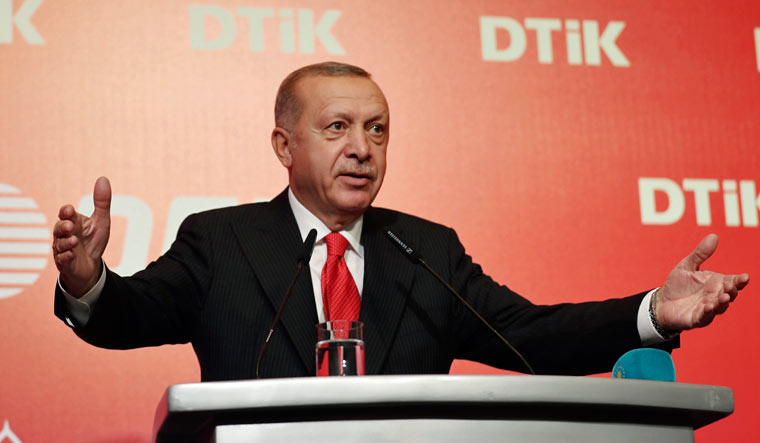Turkish President Erdogan had visited the Ukrainian capital Kyiv last week. He also had a meeting with President Vladimir Zelensky. Turkey is a key NATO member. And so, Erdogan’s presence in the region piques certain interest. Turkey, it seems, might be veering towards a foreign policy that ensures zero or minimal conflict. On January 31, representatives from Turkey and Armenia met in Moscow to renew diplomatic ties that were severed in 1993. What exactly are Erdogan’s goals in trying to be the mediator in Ukraine remains to be seen.
A Russian invasion of Ukraine would set off a major crisis. This concern has been voiced by Turkey. Turkey has close ties with Russia and Ukraine, and believes that it can help defuse the situation. "Turkey is prepared to undertake its part in order to end the crisis between two friendly nations that are its neighbours in the Black Sea," Erdogan told AP. “I have stressed that we would be happy to host a summit meeting at a leadership level or technical level talks," he said after he met with Zelensky.
Last week Erdogan had said that it will not be ‘rational’ if Russia invades Ukraine and that, as a NATO member, Turkey will do whatever is necessary to prevent it. Erdogan also hopes to host Russian President Vladimir Putin after Putin attends the winter games in Beijing.
In November 2021, Turkey hosted the crown prince of Abu Dhabi, Mohamed bin Zayed Al Nahyan, to thaw relations with the nation that had been tense since the early 2010s. Erdogan has also announced a visit to Saudi Arabia in February and Turkey has recently shown a more peace-making approach towards Egypt and the UAE in the conflict in Libya.
Turkey’s foreign policy, on the whole, seems cooperative towards its neighbours. In the early years from 2002-2007, Turkey’s foreign policy focused on building good relations with the European Union. Post that, under the influence of foreign minister Ahmet Davutoglu, the country’s focus moved towards the East. Of Turkey’s approach towards its Eastern neighbours, Davutoglu had said, Turkey’s ‘soft power’ would make it "a proactive, trustworthy, and great actor in the region".
In 2016, the tone of the foreign policy turned towards the pursuit of national security interests. The tone seems to be shifting again towards neighbourly appeasement. Turkey might be a NATO member, but maintains economic and military ties with Russia. Russia and Turkey, however, are also on opposing sides in the conflicts in Syria and Libya. And in the conflict between Armenia and Azerbaijan. But, Erdogan does seem keen against rocking the boat. At the same time, Erdogan did not back away from a deal providing arms to Ukraine, first drafted in 2019 and was expanded into a new accord on Thursday. Putin, in December 2021, had said that Ukrainian use of Turkish armed drones was “destructive” and “provocative activity”, the New York Times reported.
In April 2021, US President Joe Biden recognised the Armenian genocide at hands of the Ottoman Empire in 1915. And Turkey’s claims on Eastern Mediterranean led to the US and France coming to Greece’s aid through military agreements. This again raises the question as to Erdogan’s true intentions in the Ukraine issue. But again, several of Turkey’s regional initiatives have taken a confrontational tone with Russia. Turkey, in 2014, had rejected Russia's annexation of Crimea and viewed Russia’s militarisation of the peninsula in the Black Sea as a security threat. Turkey has also supported Georgia and Ukraine’s membership to NATO.
Turkey would be hard-pressed to join any future Russian sanctions or operations. Turkey, which is dealing with a significant economic problem, relies on tourism revenue to aid its economy and give essential foreign cash, and Russia is the country's primary tourist destination. After Ankara shot down a Russian military jet stationed in Syria in 2015, Moscow took advantage of the situation, banning tourist flights to Turkey as well as agricultural imports.
All in all, Turkey needs to tread carefully in the region.





